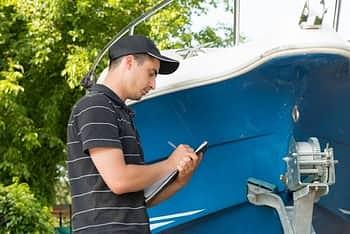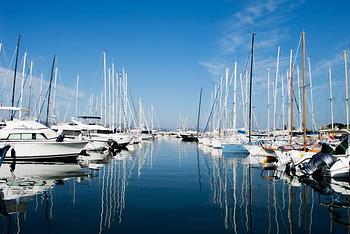Thousands of used boats change hands every year all over the world, and the market is always active. While many people choose to use a broker to act as the middleman in the negotiations and provide a point of contact and contract to come back to if anything goes wrong down the line, many buy from private sellers, primarily in the case of smaller boats. While there is no warranty when buying privately, there are ways you can protect yourself and make a savvy and safe purchase—and sometimes save some money in the process.
Private sellers generally sell their boats "as shown." This means that there is no recourse afterwards if something goes wrong. So to make a good used boat purchase from a private seller, you have to do your homework and make sure you’ve ticked all the boxes.
Use our Buying a Used Boat Checklist and consider the following key points to help you on your way.
Make Sure You See the Boat
The most important thing initially when buying a used boat is to make sure you see the boat yourself. While this might sound obvious, it is sometimes tempting to jump at a bargain boat that isn’t close by and to trust everything you’re being told. While most private sellers are honest, they have no obligation to divulge any issues with the boat that you don’t specifically ask about. In seeing the boat first-hand, you can get a feel for the seller themselves in addition to giving the boat a thorough inspection. It is also the most essential way to avoid scams when buying a used boat.
You can find used boats listed in many places, from local newspapers and marinas to online websites. Make sure that there is a phone number, and you speak to someone on the telephone and not just via email—it’ll allow you to ask questions such as the location of the boat, its condition, whether it has its service records and title, and why they’re selling the boat.

While this might sound obvious, the most important thing initially when buying a used boat is to make sure you see the boat yourself.
Give the Boat a Thorough Inspection
Start by inspecting the boat yourself and getting a good feel for its condition. Take your time and don’t let a seller rush you. If they’re trying to stop you seeing something, there’s a reason for it. The level of inspection will vary depending on the type of boat you’re buying. Small skiffs, Jon boats and RIBs with outboard engines are considerably more straightforward than a 38-foot sailboat or a 45-foot center console sports boat. Check out our guide to inspecting a used boat to learn more about what you’re looking for.
Give the Boat a Sea Trial
It’s all very well inspecting the boat ashore or tied up in a marina, but you also need to see how the boat runs underway. A sea trial is important for any boat, so before you go and view it, make sure the seller knows you’re expecting a sea trial and give them time to arrange lifts or ramp slots. While on the sea trial, ask lots of questions, and get the seller to give you a briefing on how everything works. Turn on every switch and light, try out all the electronics and instruments, listen to the engine, and inspect the bilges.

Before you go and view it, make sure the seller knows you’re expecting a sea trial and give them time to arrange lifts or ramp slots.
Complete a Marine Survey
If you’re happy with the boat so far, then the next step is to schedule a marine surveyor (this won’t be relevant for small boats). Choose a surveyor that you find and not one that the seller recommends. While they are likely just being helpful, it’s better to get someone impartial. You might want to arrange the marine survey and sea trial on the same day so the surveyor can see the boat running.
A marine surveyor will be able to spot major issues that a boat may have, as well as give you a valuation. They will look at everything from the structural integrity of the boat to damp areas, electronics, sails, and more. You may want to consider having a technician inspect the engine separately, as this is one of the biggest issues with used boats and can be a very costly one to fix. Read our guide to conducting a pre-purchase survey on a used boat.
Check the Paperwork
Depending on where you’re buying the boat, different titles will be required to legally own it. Before signing any contracts or handing over deposit money, check that the seller has everything in order. In the United States, a title document is usually required for most boats, and it’s important to check that there are no liens on the title that you as the new owner might be liable for. Check also that the Hull Identification Number matches that imprinted on the boat. In all regions, ask for a bill of sale from when the current owner purchased the boat and check whether the vessel is VAT paid if appropriate to your country.
Negotiate the Price
As with automobiles, people often like to buy a used boat from a private seller to potentially get a lower price than working with a broker. Broker fees and advertising are saved by the seller and the savings may be passed on to the buyer. On the other hand, a broker often saves the buyer money through knowledge of how much the boat is worth and advice on negotiating the price. Either way, negotiating the price is an option to consider. Once you are armed with the findings of the marine survey and the sea trial, make a counter offer on the asking price and be ready to negotiate from there. Check out our top tips for successful negotiations.

Once you are armed with the findings of the marine survey and the sea trial, make a counter offer on the asking price and be ready to negotiate from there.
Draw Up a Purchase Agreement
Once a final purchase price has been decided, it’s time to draw up a boat purchase agreement (or bill of sale). The agreement should list everything that you have agreed with the buyer will be on board from electronics to lines to decorative items and everything in between. Leave nothing off the list. The purchase agreement is your final step in ensuring you are buying a sound, safe, and savvy boat, so take your time and don’t feel pressured. There are excellent templates online you can use. You might also want to consider adding in a section that asks the seller to state if they are aware of any serious defects, accidents, or sinkings that the boat may have been involved in. Sellers aren’t legally obliged to disclose any information you haven’t asked for, so this is a good way of covering yourself legally. Once you have both signed the purchase agreement and exchanged money, the boat will be yours and your new and exciting journey begins.
Why Buy a Used Boat From a Private Seller?
With the responsibility placed squarely on your shoulders to ensure you are buying a good boat, you may ask what the benefits are when buying from a private seller as opposed to through a broker? We have looked at price being one potential advantage, as private sales may save you on commissions and fees (check out our article on Buying a Cheap Boat, Is it a Good Idea?) By expanding your search to include private sellers, you may also be increasing your choices, too. That being said, a broker may be able to search for and locate boats of which you are unaware. For many people, having a broker as a partner in your search for the right boat is well worthwhile.
This article was published in January 2022 and updated in December 2023.
Related Articles and Guides
6th Dec 2023
Boat Inspection Checklist: How to Inspect a Boat Before Buying
28th Nov 2023
Sea Trial: Costs, Checklist and More
1st Nov 2023
Types of Marine Surveys: Pre-Purchase, Condition and Damage Survey
27th Oct 2023







